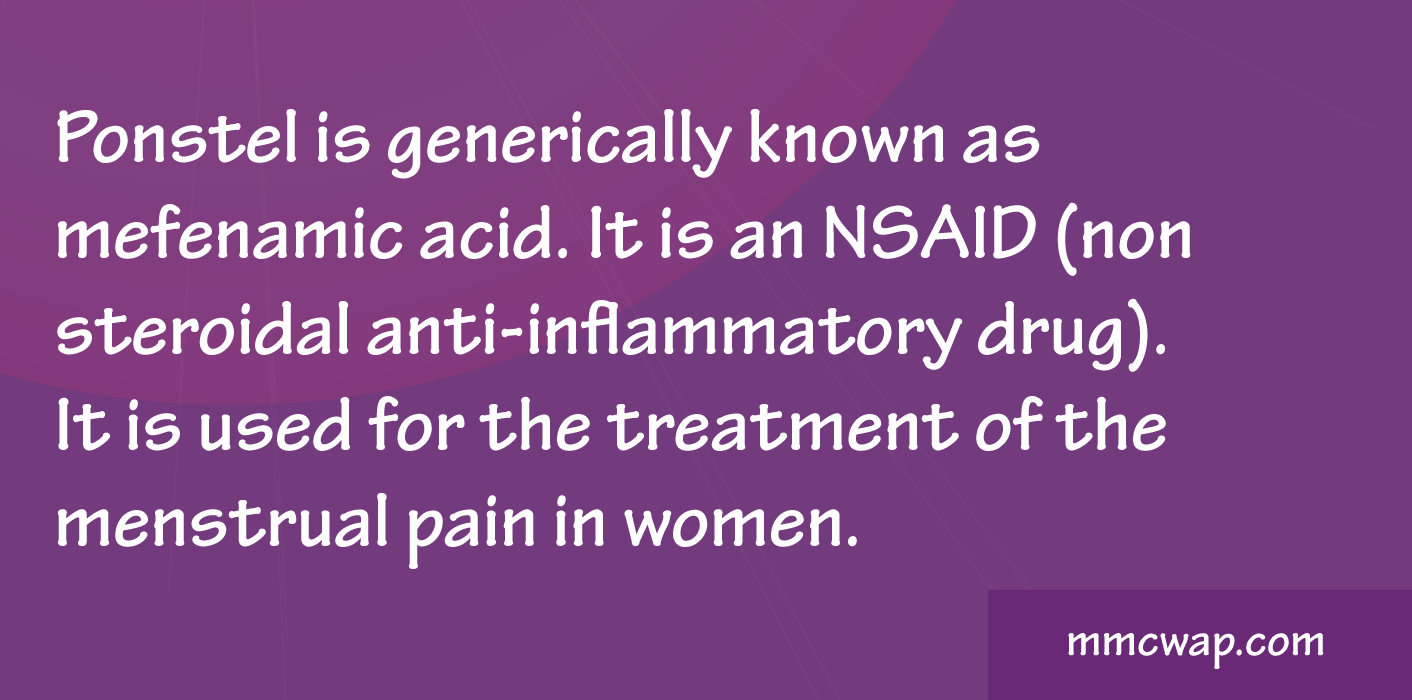Ponstel
Ponstel is generically known as mefenamic acid. It is an NSAID (non steroidal anti-inflammatory drug).

Uses
It is used for the treatment of the menstrual pain in women. It may be used for a short term treatment of moderate to mild pain (for not more than a week). The exact mechanism of action of this drug is not known yet. It may interrupt some substances in the body that are associated to inflammation. NSAIDs are used to treat the symptoms of inflammation and pain. They do not treat the disease causing these symptoms.
How To Use
Take Ponstel orally as directed by your doctor. It may be taken with food if you experience indigestion. Taking it with food may not reduce the chances of bowel or stomach problems such as ulcers or bleeding. Take this drug with a glass full of water.

Side Effects
Some of the side effects caused by this drug are as follows: diarrhea, constipation, gas, dizziness, headache, nausea, heartburn, stomach upset, severe allergies, hives, skin rashes, trouble breathing, chest tightness, itching, swollen face/lips/mouth/tongue/throat, bloody stools, chest pain, change in the urinal volume, confusion, depression, dark urine, fast heartbeat, mental changes, mood swings, one-sided numbness, fever, persistent sore throat, chills, swelling, redness, peeling, blistered skin, severe headaches, seizures, ringing in the ears, severe nausea, shortness of breath, severe vomiting, unexplained weight changes, swollen legs/hand/feet, unusual bleeding, easy bruising, vision disturbances, speech changes, unusual tiredness, yellowish skin or eyes.
Contraindications
Don’t use Ponstel if you are pregnant or are trying to conceive or are lactating. Let your doctor know about all the products you use such as any prescribed medicines, herbal preparations, non-prescribed drugs or dietary supplements. Tell your doctor if you have any allergies to foods, medicines or other products. Some medical conditions may interact with this drug. Let your doctor know if you suffer from any of the subsequent medical conditions: if you are hypersensitive to any ingredient in Ponstel, if you have a history of severe hypersensitive reactions (like hives, skin rashes, dizziness, growths on nose, trouble breathing) to aspirin or any other NSAIDs such as celecoxib or ibuprofen, if you have recently had a bypass heart surgery, if you are in the last trimester of pregnancy, if you have kidney problems, inflammation of stomach, ulcers, bowel problems, liver disease, diabetes, fluid retention, asthma, swelling, nasal polyps, high blood pressure, mouth inflammation, bleeding problems, clotting problems, blood disorders, heart problems, stroke, heart failure. Serious bleeding or stomach ulcers may occur with the use of this medication. Taking it in large amounts or for a long time, drinking alcohol or smoking may increase the chances of these side effects. Ponstel may be responsible for drowsiness or dizziness. Thus do not drive, operate machines or perform any such activities that require alertness.
Pregnancy And Ponstel
Ponstel may prove to be harmful for the fetus. Do not use this medication during the last trimester of your gestation period. Ponstel is found in the maternal milk. Avoid using it during breast-feeding.
Mefenamic Acid
Mefenamic acid is a nonsteroidal anti-inflammatory drug used to relieve pain, inflammation, and fever. Medication works by inhibiting the production of certain natural substances in the body that cause pain and inflammation, particularly prostaglandins.
Menstrual Pain
Menstrual pain, also known as dysmenorrhea, is a common issue experienced by many women during their menstrual cycle. There are two primary types of dysmenorrhea:
- Primary Dysmenorrhea: This type of menstrual pain isn't associated with any underlying medical condition. It typically begins within a few years after a woman starts menstruating. Primary dysmenorrhea is caused by natural chemicals called prostaglandins, which trigger muscle contractions in the uterus. Higher levels of prostaglandins can lead to more severe menstrual cramps.
- Secondary Dysmenorrhea: This type of menstrual pain is often caused by an underlying medical condition, such as endometriosis, fibroids, pelvic inflammatory disease (PID), or adenomyosis. Secondary dysmenorrhea usually starts later in life and may be associated with other symptoms like heavy bleeding, irregular periods, or pain during sex.



